Management Themes (Part 1) explored the ownership, licensing and environmental management themes and highlighted corresponding legislative provisions within the Petroleum Activities Act 17 of 2023 (PAA). In this publication, we will look at maximising access to petroleum resources.
Management Theme – Maximising Access to Petroleum Resources
Key to the development of the petroleum sector is access to Guyana’s petroleum resources. This is primarily done through the conduct and regulation of petroleum operations.
Section 2 of the PAA defines petroleum operations as “…exploration operations, appraisal development and production operations…including construction, operation and maintenance of all necessary facilities, plugging and abandonment of wells, safety, environmental protection, transportation, storage, sale or disposition of petroleum to the delivery point, site restoration and any or all other incidental operations or activities as may be necessary and required.”
Management Theme – Maximising Access to Petroleum Resources
As defined in the PAA, petroleum operations are comprised of a wide range of activities and processes which together provide access to petroleum resources. Under this theme, our focus will be on some of the key legislative provisions relating to exploration and production operations, including the processes related to the discovery of petroleum, which are intended to give the scope, flexibility and regulatory surety required to facilitate maximum access to these resources.
Exploration
Exploration operation matters are addressed in part III, sections 18 to 31 of the PAA, and they range from surveys, exploration work programmes and budgets, discovery of petroleum and commercial discovery. This part also includes provisions relating to the retention of a discovery and the relinquishment of areas previously granted.
- Surveys
Section 18 provides for the granting of permits to carry on geological, geophysical and other surveys and investigations that are relevant for the identification of petroleum reservoirs or exploration or production activities. This section also provides for the supply of information obtained as a result of any survey or investigation to be supplied to the Minister.
- Exploration Work Commitments and Spending Obligations
The PAA requires either the exploration licence or the petroleum agreement to mandate minimum exploration work commitments and spending obligations – section 19. Matters pertaining specifically to exploration work commitments and spending obligations are contained in section 21, which states:
The licence holder must comply with all the requirements and expenditures of the minimum exploration work commitments.
A detailed and adequate annual work programme and expenditure plan – also called Work Programme and Budget (WP&B) – must be submitted for the Minister’s approval.
An adequate annual WP&B must be consistent with the conditions or requirements relating to work and expenditure contained in an exploration licence or petroleum agreement.
The WP&B may only be amended with the Minister’s approval, provided that the amendment does not reduce the minimum exploration work commitments and spending obligations.
Failure to carry out any part of the WP&B mandated in the licence or petroleum agreement or the annual WP&B submitted for the Minister’s approval is subject to the penalty contained in the exploration licence or petroleum agreement.
Section 54 of the PAA provides that the licence holder may be required to provide financial assurance, in the amount and on such terms as the Minister finds appropriate, to ensure compliance with the PAA, the exploration licence or the petroleum agreement. The financial assurance means one or more of the following: cash, a letter or credit from a bank, a guarantee or a performance bond.
- Relinquishment (Exploration Licence Renewal)
Relinquishment in relation to the renewal of an exploration licence occurs when a licence holder returns to the State portions of acreage granted under a licence, and this is usually required to be done in a manner which is suitable for the returned acreage to be allocated under a new licence, if required. Section 24 provides for the relinquishment of a portion of the area first licenced or a portion of the remaining licenced area as a condition for renewal of an exploration licence. The PAA’s relinquishment requirements may be further or alternatively provided for in regulations made under the PAA. Discovery areas are usually excluded from the requirement of relinquishment.
In our next publication, we will continue our review of some of the key legislative provisions relating to exploration and production operations, which are intended to give the scope, flexibility and regulatory surety required to facilitate maximum access to these resources.
DISCLAIMER: This series is not intended to serve as a replacement for the Petroleum Activities Act 17 of 2023, nor is it a substitute for legal or other professional advice in any manner whatsoever.



